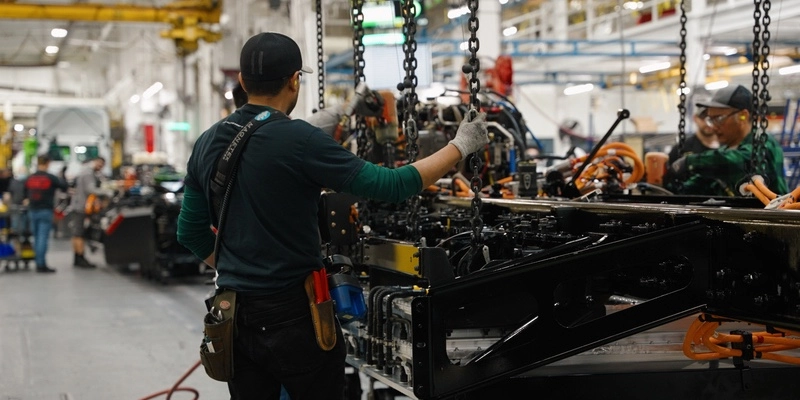Daimler Truck North America LLC (DTNA) embraces a holistic circular economy approach, transforming how lithium-ion battery materials are managed across its operations.
This strategy, encompassing repair, remanufacturing, repurposing, and recycling, is set to redefine sustainable practices in the industry.
DTNA’s circular economy approach aims to maximise battery lifespans and minimise material waste.
By extending the usability of rare-earth materials and products, addresses global sustainability challenges head-on.
Leveraging advanced technology, it can discern when a lithium-ion battery no longer meets its high standards for vehicle use, guiding the decision-making process on the optimal method to maximise materials for a second life, with repair as the preferred option whenever feasible.
While much attention is given to cells due to their use of rare-earth metals like cobalt and nickel, DTNA’s approach extends to all components of EV products.
“As part of our commitment to maximising material lifecycles, we meticulously assess environmental and ethical implications from sourcing to post-production,” said Rakesh Aneja, Vice President and Chief of the Zero-Emission Transformation Group at Daimler Truck North America.
“Our primary goal is to repair our lithium-ion battery materials and reduce the consumption of new resources,” he adds.
Remanufacturing for sustainability
When a cell or electric vehicle component is beyond simple repair, it enters the remanufacturing process at existing Detroit Diesel Remanufacturing locations across the U.S., such as the recently expanded Hibbing facility.
This process involves partial disassembly, module replacement, and rigorous testing for optimised reliability.
All remanufactured products are updated with the latest technology and must meet or exceed new product standards to be reintroduced to the market.
Remanufactured products are not only a sustainable solution but also improve the total cost of ownership, benefiting both DTNA’s customers and the environment.
Daimler Truck North America has partnered with Nuvation Energy to pilot a battery energy storage system (BESS) designed to assist in charging, peak shaving, backup storage, and microgrid scenarios.
This innovative solution enables DTNA to repurpose batteries that cannot be reused in a vehicle, further extending their useful life and reducing waste.
Moreover, the company has created a process in partnership with Li-Cycle, a leading lithium-ion battery resource recovery company, to responsibly recycle critical battery-grade materials for batteries that reach the end of their life cycle.
Li-Cycle uses an environmentally friendly and safe method that recycles batteries within a liquid-based solution, achieving up to a 95 per cent recovery rate for returning critical materials back to the battery supply chain while producing minimal water discharge.
Commitment to sustainable operations
Since 2006, DTNA has placed a high priority on establishing recycling solutions within its production facilities.
Early initiatives, such as achieving ISO 14001 certification at every plant in the U.S. and Mexico by 2008 and Zero Waste to Landfill status at all plants by 2017, underscore DTNA’s commitment to sustainable practices.
Not only does the company provide practical solutions for its production facilities, but it also communicates a clear recycling strategy to its customers from the outset.
In line with its sustainability goals, it aims to achieve carbon neutrality for all new products and services from direct suppliers in Europe, the United States, and Japan by 2039.
As early as 2020, the Portland Truck Manufacturing Plant, where the Freightliner eCascadia and eM2 are built, achieved CO2-neutral production by reducing energy consumption and offsetting on-site emissions.
Daimler Truck North America further plans to achieve CO2-neutral production at all its remaining truck manufacturing plants by 2025.







